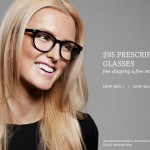What does a brand that fully embraces both left- and right-brain thinking look like? (Okay, besides Apple.) Warby Parker, an upstart eyewear company, has created an exceptionally smart, integrated, whole-brain brand. In just over a year, WP has emerged as a cult fashion resource, a force for good in the world—and a great place to buy a monocle. Here’s how:
Left-brain breadth
 The four founders met as MBA students at Wharton, so it’s no surprise that Warby Parker packs plenty of traditional business acumen, including:
The four founders met as MBA students at Wharton, so it’s no surprise that Warby Parker packs plenty of traditional business acumen, including:
- Strong value proposition: High quality at a low price has perennial appeal, and WP offers top-quality all-inclusive glasses at a low price. How does $95 sound vs. $400?
- Updated business model: By selling online direct to consumers, they eliminate the large markups that exist at multiple points in the conventional eyewear value chain and pass the savings on to consumers.
- Distinctive product: WP focuses on a core range of retro/classic styles with strong preppy-funk appeal. Think Winklevi.
- No risk: Taking a page from Zappos’ playbook, WP offers free shipping and returns. Going Zappos one better, they’ll send 5 pairs to try on at home for free for 5 days, no purchase necessary.
- Convenience: Don’t have your prescription? No problem. Give them your eye doctor’s name and they’ll track it down.
Right-brain depth
Warby Parker’s left-brain elements alone are not unique. Other companies sell directly online at lower prices (39dollarglasses) and even offer innovative styling (Zennioptical). Trendsters can also find reasonably priced glasses elsewhere with vintage/retro cool and plenty of personality (SEEeyewear).
 It’s Warby Parker’s integration of right-brain elements that makes the brand so distinctive and compelling, including:
It’s Warby Parker’s integration of right-brain elements that makes the brand so distinctive and compelling, including:
Deeper stories:
“The industry is controlled by a few large companies that have kept prices artificially high, reaping huge profits from consumers who have no other options.”
Like Apple, Warby Parker embodies the Rebel archetype. Since the technology has been around for 700 years, WP asks, why should glasses cost as much as an iPhone? A modern-day David, WP takes on entrenched eyewear Goliaths like Luxottica, which owns top licensed brands (like DKNY, Prada, Ralph Lauren), sunglass brands (Ray-Ban, Oakley) and even major retailers (LensCrafters, Pearle Vision, Sunglass Hut).
Human impact:
“We believe that everyone has the right to see.” A simple statement, but bold for an eyewear firm—and it’s backed by action. Warby Parker donates a pair of glasses with each pair sold, partnering with non-profits to distribute them where needed. To date, WP has donated over 30,000 pairs of glasses to people in 36 countries.
Real people:
“We want to be friends when this is over.” As Neil Blumenthal describes in a recent Tedx talk, the founders make their friendship a priority, with monthly check-ins on its status. The company’s name, inspired by two Jack Kerouac characters, reflects their playful spirit. Warby Parker is run by interesting, genuine, multi-dimensional people, and it shows.
Whole-brain smarts
Plenty of creative, values-driven companies have crashed and burned, and right-brain inspiration alone is no guarantee of success.
 It’s the interplay and integration of left- and right-brain thinking that makes it work so well. The stacked bar-chart comparing WP’s cost structure vs. competitors and the tweedy model, complete with monocle, mustache and full-arm tattoo. The large-hearted glasses donation program and its savvy, intelligent execution.
It’s the interplay and integration of left- and right-brain thinking that makes it work so well. The stacked bar-chart comparing WP’s cost structure vs. competitors and the tweedy model, complete with monocle, mustache and full-arm tattoo. The large-hearted glasses donation program and its savvy, intelligent execution.
Whole-brain thinking is what makes brands iconic. More often, it’s the right-brain piece that’s missing.
What brands do you see that embody both right- and left-brain thinking? Please submit your suggestions below. And, as always, comments welcome!




Ophthalmologists are physicians. They went to medical school. After school, they had a one-year internship and a residency of three or more years.^;`^
With best thoughts http://healthmedicinebook.com
Thank you for your comment, Rolland. I used the term “eye doctor” generically and colloquially as it’s used commonly in the U.S. I certainly have tremendous respect for ophthalmologists and appreciate all the rigorous medical training they undertake. This is something I know first-hand, as my brother-in-law is an experienced ophthalmologist. Best wishes.